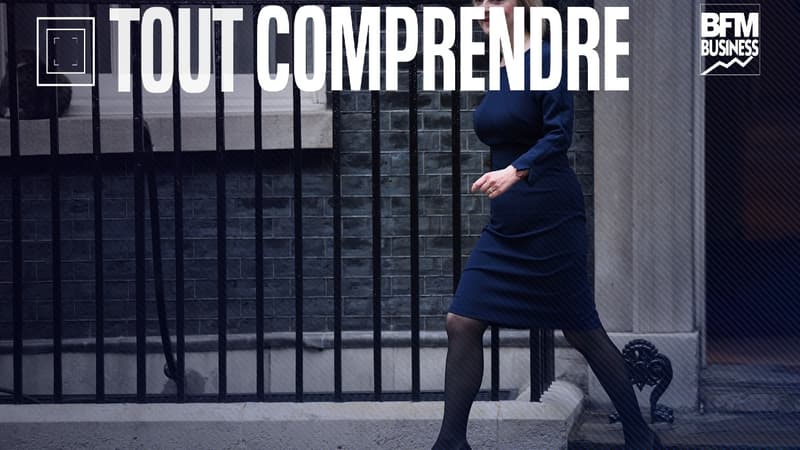According to the British press, his days at 10 Downing Street are already numbered. Accused of setting off an economic storm by announcing a costly budget plan, the UK’s new Prime Minister, Liz Truss, finds herself in a delicate position, less than a month from taking office.
A “disastrous start,” summarizes The Economist, which illustrates the cover of its latest edition with a montage of the conservative leader and her finance minister, Kwasi Kwarteng, on a sinking ship.
• Why has the budget plan caused a panic?
Developed to stimulate growth and curb inflation close to 10%, the “mini budget” unveiled last Friday by Kwasi Kwarteng promises to freeze energy prices for individuals and businesses, as well as massive tax cuts, especially for the wealthy. The planned expenditure, of which only part of the cost – aid for six months’ energy bills – has been quantified by London, is estimated by economists between 100 and 200,000 million pounds.
Given the scope of this more than vague financing plan, the markets saw red numbers. At the start of the week, a wind of panic swept across the British economy, with the pound falling to an all-time low to approach parity against the dollar, while UK interest rates soared to levels not seen since the crisis. financial.
This turbulence had consequences in the real estate market where on Thursday 40% of the products offered by credit institutions had been withdrawn. Real estate rates continued to rise. A sign of rising monthly payments for many Britons who have borrowed at variable rates.
• What reactions abroad?
Rare enough to report, the International Monetary Fund released a statement to say it was “closely monitoring” the situation in the UK. “Given the high inflationary pressures in a number of countries, including the UK, we do not recommend any significant unfunded fiscal action as it is important that fiscal policy does not get in the way of monetary policy,” the monetary institution said.
“The November 23 budget presents an opportunity for the British government … to reassess its fiscal measures, particularly those aimed at the highest incomes”, which risk “increasing inequalities”, the IMF added in his press release in the form of a snub to Liz Truss and Kwasi Kwarteng.
Rating agency Moody’s said large tax cuts not financed “by government spending cuts” will lead to higher structural deficits, which are unlikely to solve “long-term” growth problems and could lead to debt that is hard to hold.
Asked about the issue, US Finance Minister Janet Yellen also indicated that the US Treasury was closely monitoring the economic situation in London. In France, where budgetary rigor is not really on the agenda, even Bruno Le Maire said he was “concerned” about the economic situation in the UK following “spectacular announcements” by the British government that “disturb the market”.
• What reaction from the Bank of England?
To protect the economy and in particular certain pension funds on the verge of collapse, the Bank of England intervened urgently this week announcing the purchase of 65,000 million pounds of government bonds at 15, 20 and 30 years. “The market movement has been exacerbated since yesterday (Tuesday) and particularly affects long-term debt. If this market dysfunction continues or worsens, it would pose a real risk to UK financial stability,” the BoE warned on Wednesday. to justify their intervention.
On the same day, the UK Treasury defended its budget plan despite harsh and unusual criticism from the IMF. “We acted quickly to protect homes and businesses this winter and next winter, following unprecedented increases in energy prices fueled” by the war in Ukraine, the Treasury said in a statement.
“We are focused on growing the economy and living standards for all and the Chancellor will publish a medium-term budget plan on November 23” that “will ensure that debt falls as a share of GDP” (around 100% today), said. additional. On Thursday, Liz Truss herself took on the “controversial and difficult” measures taken by her government. “We had to take decisive action to help people through this winter and next. (…) We had to take urgent action to grow our economy, to move Britain forward and also to deal with inflation.” she said.
• How did the markets react after the intervention of the BoE?
Thanks to intervention by the Bank of England to allay investor fears, UK bond yields eased on Wednesday. On Friday, the ONS estimate of British GDP for the second quarter at +0.2% also reassured markets by dismissing immediate recession fears. In fact, the statistics institute initially expected a drop of 0.1%.
Following this breath of fresh air for the British economy, the pound jumped again against the dollar. In contrast, where the ONS thought that GDP had already surpassed its pre-pandemic level of 0.6%, the latter is in fact still 0.2% below its level at the end of 2019.
“The good news is that the economy is not yet in a recession. The bad news is that, contrary to popular belief, it is not yet back to pre-pandemic levels,” said Paul Dales of Capital Economics. “It is the only G7 economy in this situation and that makes the budget plans” of the Ministry of Finance “even more unsustainable”, according to him.
Source: BFM TV


